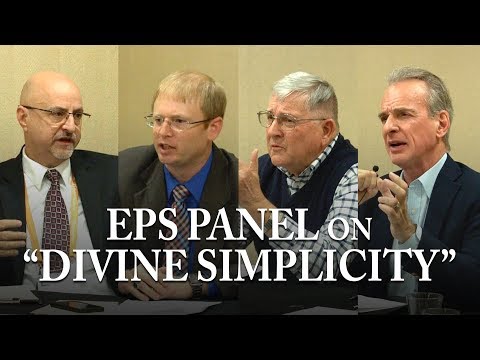In November of 2018 I was on a panel with Richard Howe, Stephen Davis, and William Lane Craig at an Evangelical Philosophical Society session hosted by the American Academy of Religion. The topic was “Divine Simplicity.” It can be viewed here. Howe argued for why it is true, Davis argued why it is not necessary, Craig leveled various critiques of it, and I defended it.
(You can read this article for a discussion of what divine simplicity is.) Craig brought up the same basic objections in our panel as he did with Bishop Barron in January of 2018 on another panel on the same topic. I have addressed several of those objections in a previous post but would like to elaborate further on some of those objections, as well as address some of his points that came out in our exchange but not in the previous one.
This was my first interaction with Davis and Craig, and they were a delight to work with. (Howe and I are colleagues at Southern Evangelical Seminary.) While Howe and I disagree with Davis and Craig on this immensely important topic, I consider them excellent scholars and gentlemen. I am more familiar with Craig and have found him to be a very sincere man of God. Due to his influence on evangelical thinking, my responses will focus on his objections.
Craig’s Objections and My Responses (Our Opening Statements)
Craig’s first few objections were made in the 2018 panel to which I responded in my article, but I will quickly respond to some of those while spending more time on others. First, Craig stated that divine simplicity is unbiblical in that the Bible never teaches the doctrine and actually teaches things about God that could not be the case of divine simplicity were true. Examples would be various descriptions of God having multiple properties, such as God being powerful, wise, etc. Such would be distinct properties, but divine simplicity states there are no distinctions in God, so the latter must be false, says Craig.
In my opening I agreed with Craig that the Bible does not explicitly teach divine simplicity; however, I also maintained that the Bible does not teach anything that is contradictory to it. For example, we use various ways of describing God, such as the words ‘powerful,’ ‘wise,’ etc. We really mean different things with these words. But we know God (and everything) through complex ways and complex things. (Here ‘complex’ means that a thing is made up of various parts, immaterial or material. So, it means the opposite of simple.) But just because we necessarily know God through complex means, i.e., through nature and the Bible, that doesn’t mean that God exists in the way that we know him. There is a distinction between our epistemology of God, and the ontology of God. When we use various words to describe God, our limited descriptions don’t limit God. If we are going to describe God’s attributes (or properties) there is no other way to describe him than by saying he has qualities x, y, and z. So the way we know him is through his effects—the world (and Scripture)— which are complex. But it doesn’t follow that just because our descriptions of him are complex that he is actually complex. If the arguments for divine simplicity are sound, then God is simple and the way we describe him is just the limitations of human language since we know the material world directly via experience but God indirectly via the world.
Craig further states that the “terrible consequence of Thomism is that the biblical attributes are annihilated” since God can’t be positively described if simplicity is true. Thomists would deny this and say that the biblical and theological descriptions of God are true pictures of God, but true analogously.
Craig worries that divine simplicity “makes God unintelligible.” Craig says it makes no sense to maintain, as the Thomist does, that God is Pure Act and that his essence just is existence. Further, if God is identical to all he “has,” as simplicity says, and if God has properties, then he just is a property. (This last point is made by Alvin Plantinga in his Does God Have A Nature.) It is true, as Howe pointed out, that since we don’t know God directly then we don’t know what he is in himself. This is further true since God is an infinite being and we are finite. It is also true that Thomists hold to a qualified agnosticism about God’s nature (not his existence). However, I think it is the case, again as Howe points out, that everyone is agnostic about God’s nature to some degree since most if not all Christians would admit that they don’t know everything about God. I would also point out that saying God is beyond our comprehension is not a weakness of God but rather shows how great he is. If we could understand God, then he wouldn’t be much of a God.
However, Craig is not just saying that because divine simplicity leads to agnosticism that it must be false. He’s saying that there are logical problems with it, such as God just being a property. This is where Craig and Thomists would disagree over terms. Properties in the historical sense are ways that real metaphysical things (on the Platonic model) exist in relation to another thing, or (in the Aristotelian model) the way in which a thing can be modified. The latter can also be called an accident. However, accidents are explicitly denied of God according to divine simplicity since they would modify God’s existence and thus introduce potency, parts, and complexity. Rather than use the word ‘property’ Thomists would rather use the word ‘attribute’ since the latter is not a thing to be possessed the way that properties often are described. (This is actually a curious case with Craig since he rejects a Platonic notion of properties.) Attributes are just ways we can describe God. Many times, properties are said to be “had” or “possessed” by God. Thomists simply deny this about God and so this particular objection doesn’t exactly apply since Thomists don’t, at least generally, mean the same thing by ‘properties’ as Craig does.
Craig’s other objections along this vein are more puzzling. Given simplicity, he says that God is not personal, doesn’t love, and is not active in the world. In his Time and Eternity, he states that divine simplicity leads to the conclusion that God “does not literally love, know, or cause His creatures” (30). Thomists simply would reject this as a mischaracterization and misrepresentation of divine simplicity. God is certainly personal, but he is not a person in the way that humans are. However, it seems that Craig wants to maintain a univocal view of personhood as it relates to humans and God. (Much of the debate we had centered around the issue of whether our language applies to God univocally or analogically.) However, Howe and I maintain that we can make true statements about God without our language being univocal. Thus, to say God is personal reflects truth about God but it does not say that he relates to his creation in the same way (i.e. univocally) as we do. This should not be surprising since finite, material, changing beings are qualitatively different than an infinite, immaterial, unchanging being (although in some ways Craig says that God is simply quantitatively different from us, such as our level of knowledge).
It is not clear to me why God could not love given simplicity. However, at least one traditional view of love is the willing of another’s good. God certainly wills the good of his creation. Thus, he loves. To say God is not active is hard to understand since the Thomist says that God is pure act. God is not just active in the world; he is actively upholding the world’s very existence. Without such sustaining activity the world would not exist since it doesn’t just need a reason for its beginning to exist, but also for its continued existence.
To say that simplicity leads to the conclusion that God doesn’t love, know, or cause his creation is difficult to understand. However, it seems that Craig holds this position based on his understanding of the Thomistic notion of God not being really related to the world. On the surface of this notion of God not being really related to the world, it looks like God has nothing to do with the world. However, such would simply be false. What Thomas means, a la Aristotle, is just that God is not dependent on the world. God is not changed in any way with the existence of the universe—a claim that Craig denies since in his view if God created the world, then he must be related to it. Of course, Aquinas is not denying that God is related to the world as such. He is just not related to the world in certain ways, especially any dependent way. The world is really related to God in that it depends on God for its very existence; but the converse is false: God does not rely on the world for anything. It is difficult to see how Craig would maintain that on Thomism God does not know or cause his creation; although, he would probably say that while Thomists hold those views they must do so in violation of simplicity.
The next major objection that Craig leveled at divine simplicity is the modal collapse objection. This states that according to divine simplicity God’s will is identical with his nature. Since his nature is necessary his will must be necessary too. Thus, God can only will one scenario, state of affairs, possible world to be actual, whatever you want to say. Since God necessarily wills a given world to exist, there is no other world that could possibly exist. Since God, says Craig, is the same in all possible worlds, the existence of creatures can’t be found in God since God being the same doesn’t create in one world and not in another. Also, creatures can’t explain their existence since they would need a cause, but God couldn’t be their cause, Craig says.
I offered various responses in my original critique of Craig’s position but in my panel discussion I relied on the distinction that Aquinas makes between absolute and suppositional necessity (cf. Summa Theologiae 1. 19. 3). Aquinas argues that a thing can be necessary absolutely or by supposition. The former is the case when a statement is true by definition, such as “A bachelor is an unmarried man.” Another example of absolute necessity is how God wills his own goodness. This kind of necessity is of something that just has to be the case. Thus, God wills his own goodness of absolute necessity (as Aquinas says that we will our happiness in such an absolute way). Further, Aquinas notes that there are some relations such as how the sensible faculties relate to their objects in an absolutely necessary way, like sight to color. Things are not willed in this absolutely necessary sense unless such things are necessarily required for the end, such as food for survival, as Aquinas notes. But God does not lose anything by not willing creation. He does not need it for his own end. Thus, his willing creation is not absolutely necessary. But supposing he does will it, it is willed by necessity of a certain sense: suppositional necessity. To borrow another example from Thomas, it is not the case that Socrates must sit. However, if he does sit, he necessarily sits as long as he sits. Such necessity is not absolute necessity since he does not have to sit. But supposing he sits, he sits. Hence, suppositional necessity. Since God doesn’t need the world, it is not willed of absolute necessity. But it is willed in a necessary sense like that of Socrates sitting. If God wills it, he wills it. He can’t un-will it. Thus, supposing he does will it, it is willed of suppositional necessity.
I think Aquinas’ distinction here answers the modal collapse because the collapse says that God wills of absolute necessity, or as Craig says, logical necessity. If Aquinas is right, then such is simply not the case.
The Back and Forth
Bill said I was “too cavalier” in my paper regarding the difficulties of the Trinity and simplicity. In my paper I asserted that Aquinas et al. did not see a problem with divine simplicity and the Trinity, to which Bill averred, “they most certainly did.” As I said in my follow up, what I meant was that they did not see the two doctrines as mutually exclusive or contradictory. One reason that Bill sees such a contradiction with divine simplicity with the Trinity is because he sees the persons of the Trinity as parts, which simplicity by definition denies (see his Time and Eternity, Philosophical Foundations, and my article in response to his position). As Richard stated, the doctrine of divine simplicity was actually used throughout history to defend the Trinity. James Dolezal notes, “As for the Trinity, the [doctrine of divine simplicity] was used to prove the indivisible singularity of the divine essence and thus refute the accusations of tri-theism (God Without Parts, 4. See also Jordan P. Barrett, Divine Simplicity: A Biblical and Trinitarian Account).
Around this point Steve said he could not understand why complexity in God necessitates composition. In other words, he argues that God can have parts while those parts just are necessarily his essence and would not need a composer. That metaphysical parts of a being are in a dependent relation of potency is a position that is taken as a metaphysical truism in Aristotelian/Thomistic thinking. Steven’s position was basically, “I don’t understand why God can’t be complex without being composed.” The basic answer as I responded to him while also noting that it wouldn’t satisfy him (and it didn’t) was that if there are distinct parts of a being, even God, then those parts must have a certain relation of potency to each other. Such a potential relation must be realized/made to be that way by something other than itself. Otherwise it is basically the problem of saying that something caused itself to exist, which is a contradiction since it would have had to exist prior to causing itself to exist. However, the doctrine of simplicity denies such parts to begin with.
When asked by an audience member how we are different from God, Steve said that God being simple is one way. He said that God is simple in some way but not in the Thomistic sense. Bill shares this view and wants to redefine simplicity to say that nothing has metaphysical constituent parts. Thus, all things are simple, even God, but not in an interesting way since everything else is too. However, he is quick to point out that this is not the Thomistic understanding. It is not at all clear to me what he means by denying metaphysical constituent parts to things.
Bill makes the further assertion in response to this question that we only differ quantitatively from God in some ways. For example, humans have knowledge and power in a finite way whereas God has them infinitely. This stems from his univocal view of how language applies to God. I would deny that our differences with God are merely quantitative in this way. There is a much more profound difference in unlimited being and limited being besides just amount. What ‘power’ means in reference to God and man is not the same. Such is the case for knowledge and wisdom. God does not know in the same way as we do. We use senses but God as an immaterial being has no senses. We know passively; however, God as Pure Act knows actively as the cause of all finite being (in other words God doesn’t learn).
My main objection about Bill’s position, in the panel discussion and in his writings, is that the objections he raises to the Thomistic notion of divine simplicity were raised and answered by Aquinas himself in the 13th century. However, Bill does not deal with the responses to the objections that he raises which were anticipated hundreds of years ago. (One exception is his response to the idea that all of God’s properties/attributes collapse into one if simplicity is true. In his Philosphical Foundations, he says Venus being the morning and evening star serves as a counter example since these are really distinct properties in reality and not just in our minds. I would point out though, that these properties about Venus are extrinsic to Venus and are based on our relation to it.) Bill did make the comment at the end of the panel that what is inadequate from Thomists is to cite Aquinas and think that is the end of it. However, if one is going to object to a doctrine as it was formulated by Aquinas and Aquinas already raised the very objections that he makes, then it seems necessary to explain why the responses to those objections by Aquinas fail. To move the conversation forward, it would be helpful for the objector of Thomistic divine simplicity to explain why Thomas’ responses to those objections fail.
Bill’s response to suppositional necessity was that while it is true that “If God wills x, then x happens necessarily,” the problem for Thomism is that the antecedent is necessary since God’s will and essence are identical and the latter is necessary. In other words, God must will x. However, Aquinas rejects that position because God could have willed not to create anything or to create differently than he did. The necessity can’t be in the effects, says Aquinas since they aren’t necessary. Since God could have willed other than he did and since creation is an activity of God’s will and intellect, this demonstrates that there is no absolute necessity in God willing anything or willing differently than he did. (I argue in more detail on this point in my previous article on this topic.)
All in all, the panel was a great experience for me and I appreciate the time and efforts that Richard, Steve, and Bill put into it.
Dr. Brian Huffling
Dr. Brian Huffling’s research interests include: Philosophy of Religion, Philosophical Theology, Philosophical Hermeneutics, and general issues in Apologetics and Biblical studies. See his personal blog here.

Download Your FREE eBook!
- Reading Books and Listening to Talks is Not Enough
- Not All Apologetics Methods Are Created Equally
- A Degree is More Than a Piece of Paper











